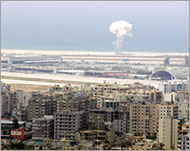Out of Beirut
When Lebanon’s 15-year civil war ended in 1990, we all hoped that the nation had finally transformed itself from a byword for urban violence into the “Ibiza” of the Middle East.

Beirut was attracting hordes of tourists, its land values were rocketing and its citizens were relishing the prospect of long overdue wealth.
As a Lebanese expat, Beirut has always been my summer destination. But by my second week there, I was sadly planning my exit strategy as Israel retaliated with waves of air and sea attacks – bombs and missiles – after Hezbollah killed eight Israel soldiers and captured another two.
I spent the first two days hoping that the situation would improve. I got phone calls from people in south Lebanon saying that their power was out and that Israeli jets were swooping overhead.
The question everyone was asking: what will happen next? What do we do if Israel really hits Beirut? Do we stay, or go?
Day four
By Saturday, our house started shaking under the increasing air raids. Israel had vowed to take
Lebanon “back a good 20 years”.
| “If Israel attacked Syria, we would have nowhere to go” |
My hopes for a ceasefire began to wither away.
I was stranded with my brother and his wife in Beirut with 10 children under the age of seven – Greek, French, British and American.
I checked with the American and British embassies about possible evacuation plans. They responded calmly: Do not attempt to travel and certainly not to Syria.
It was not what I wanted to hear. Many Beirutis had evacuation plans. They all had small bags packed and were ready to move to the mountains.
But with Israeli warships attacking ports and Beirut’s airport, we were virtually cut off from the outside world.
If we wanted to take the Syrian route, then we would have to take back roads through the high mountain passes, or head north up the coast road towards the Syrian city of Homs. But if Israel attacked Syria, we would have nowhere to go.
Open war
 |
|
No way out: Beirut’s airport is hit |
When Hezbollah leader Hassan Nasrallah declared an “open war”, we decided to flee from Beirut on a small bus with 10 kids in tow. It was now a make or break opportunity especially after Israeli air strikes hit the Beirut – Damascus highway.
Thirty minutes after our departure, the IDF began attacking our route to the border. We heard and saw the bombings. The older children cried out of fear, but the younger ones did not seem to understand what was happening.
My heart was breaking at the thought of possibly not being able to get these children back to their parents, some of whom were out of Lebanon at the time. Who can explain a mother’s anguish during these terrible times?
Finally we reached the Syrian border.
Border chaos
At the border post, the atmosphere was relatively calm, but people seemed dazed.
There were hundreds of bus loads of Lebanese and foreign refugees. Around them, people crossed the border into Syria carrying their belongings in Hessian sacks on their backs.
A bus ticket from Lebanon to Syria shot up from $15 to about $200. Taxis were charging upward of $700 per person for the four-to-six-hour trip.
 |
|
The Lebanese border: A chance to escape from the war |
We spent five hours at Syrian customs in a small room with hundreds of people seeking an entry visa. Syrian authorities were clearly unprepared for such large numbers of refugees. They sent us from one room to another.
Meanwhile, the children who were waiting in the bus grew frustrated. There was no more water nor food and no shop nearby to buy any. We had to try and pacify them while trying to find a way.
We were then told that the Syrian government had instructed all official agencies to facilitate entry procedures at the borders for Lebanese nationals. So we used our Lebanese passports instead of the British, French and Greek ones. Within 30 minutes our 13 visas were issued.
But many Americans, British, German and French tourists were still waiting to get theirs. Some gave up, but others were relentless.
Syrian support
Leaving them, we crossed the border and drove to Lattakia where our plane to London was waiting. Syria’s support for Hezbollah was clearly evident: Picture posters of Bashar al-Assad and Hassan Nasrallah hung side by side.
In the airport, with 10 exhausted children screaming for food and water, Syrian television reporters besieged us with questions and cameras: “what were you doing in Lebanon?” “were you on a holiday?” “do you always come to Syria?’”
We scrambled onto the plane, heartbroken, dishevelled and shocked by what has become of Lebanon.
Adla Massoud, a regular contributor to Aljazeera.net, was vacationing with her two children in Beirut when hostilities broke out between Hezbollah and Israel.